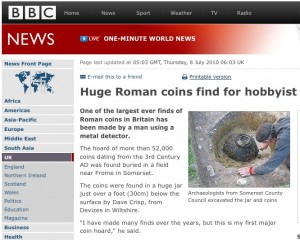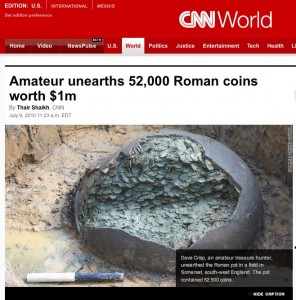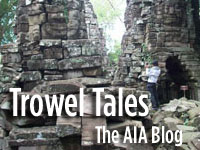Dave Crisp, Roman Coins, and the Cost
by Mark Rose
July 12, 2010
Hats off to Dave Crisp, a hospital chef who just discovered a hoard of some 52,500 3rd century A.D. Roman coins. Crisp found them in a field in southwestern England using his metal detector. By all accounts, Crisp realized that he had found something exceptional and did the right thing–and under the United kingdom’s “Portable Antiquities Scheme” all went as well as possible. Reports on BBC and CNN emphasize the fact that he quickly contacted authorities and Somerset County Council archaeologists came out and excavated the large pot in which the coins had been placed. The coins were then sent on to the British Museum. Crisp told CNN: “At the time I actually found the pot I didn’t know what size it was but when the archaeologists came and started to uncover it, I was gobsmacked, I thought ‘hell, this is massive.'”
 And that’s the story’s high point and, for me, its question mark.
And that’s the story’s high point and, for me, its question mark.
For comparison, recall the recently found hoard of Anglo-Saxon gold, military gear, and some crosses in Staffordshire, England. One of the most important finds of the period ever, it, too, was made by a metal detector enthusiast. The UK’s Portable Antiquities Scheme encourages such people to report their finds. It also assigns a value to the discovery. With the Staffordshire hoard, that was some $5 million dollars. Bottom line, the finders had to be paid a huge amount for the hoard to be kept in the relevant museums in Birmingham and Stoke-on-Trent.
I am all for free enterprise, but I am not happy about two things here. First, the assignment of a dollar value to archaeological finds makes them commodities–might as well be so many pigs or bushels of corn. Second, there’s the basic question of civic spirit. I am not saying that the Staffordshire hoard discoverers or Dave Crisp shouldn’t be rewarded. BUT where is the notion of donating something that IS a national treasure to the nation?
 In 1939, the burial of a Saxon ruler was uncovered at Sutton Hoo. You can see the finds in the British Museum. They are there because the landowner, Edith May Pretty, donated them to the nation. Dave Crisp deserves our plaudits. Hooray for Dave! He also could come in for $1 million for his discovery, if the nation and citizens pony up. Good for him, but maybe he and the Staffordshire finders can find charitable causes for at least a portion of these windfalls. If the nation pays on this scale, shouldn’t the recipient give some back.
In 1939, the burial of a Saxon ruler was uncovered at Sutton Hoo. You can see the finds in the British Museum. They are there because the landowner, Edith May Pretty, donated them to the nation. Dave Crisp deserves our plaudits. Hooray for Dave! He also could come in for $1 million for his discovery, if the nation and citizens pony up. Good for him, but maybe he and the Staffordshire finders can find charitable causes for at least a portion of these windfalls. If the nation pays on this scale, shouldn’t the recipient give some back.
The Portable Antiquities Scheme has much going for it. But I don’t like the fact that price tags, especially big ones, are placed on artifacts–that can only encourage more people to hunt for them. Will they all be as responsible as Dave Crisp? I doubt it. And it concerns me that national treasures–of any country–can be valued in dollar amounts.
Does “finders keepers” trump national, or even global, importance when it comes to cultural heritage? What do you think?
Regardless, thanks Dave Crisp for calling in the archaeologists.
Comments posted here do not represent the views or policies of the Archaeological Institute of America.






 Heather Pringle is a freelance science journalist who has been writing about archaeology for more than 20 years. She is the author of Master Plan: Himmler's Scholars and the Holocaust and The Mummy Congress: Science, Obsession, and the Everlasting Dead. For more about Heather, see our
Heather Pringle is a freelance science journalist who has been writing about archaeology for more than 20 years. She is the author of Master Plan: Himmler's Scholars and the Holocaust and The Mummy Congress: Science, Obsession, and the Everlasting Dead. For more about Heather, see our 



